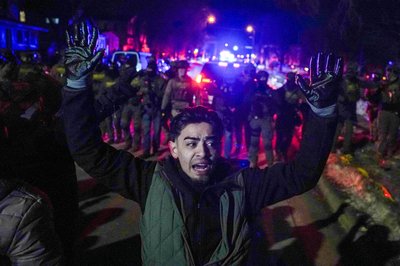Summary
For a transcript of this story, click here .
The juvenile justice system in the U.S. was created in the early 20th century with the understanding that children should be treated differently than adults within the criminal justice system.
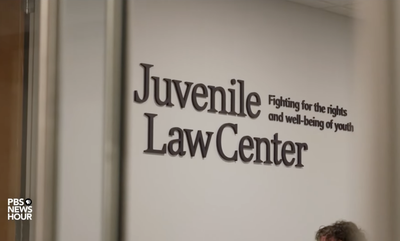
Screenshot via PBS NewsHour
That idea was challenged by a violent crime wave in the 1980s and 90s, prompting some states to practice direct file - automatically charging juveniles in adult court for serious crimes.
In 1995, Pennsylvania passed a law directing prosecutors to directly file charges against individuals 15 and older in adult court if they committed particularly violent crimes, especially if they were repeat offenders or used a deadly weapon. The law allows juveniles to be jailed in adult facilities even before trial.
In 2021, a bipartisan juvenile justice task force recognized racial disparities within the direct file. And research shows juveniles charged and incarcerated via adult court are far more likely to die from suicide; they’re also at high risk to be sexually abused. Politicians, lawyers, advocates and victims are pushing to change that practice and prevent children from ending up with adult records.
Five Facts
- What was one factor that motivated legislators to challenge the idea of prosecuting child and adult offenders under different systems?
- Where do juveniles accused of a crime under direct file spend time before trial?
- Who does direct file impact disproportionately in Pennsylvania?
- Why is direct file under scrutiny?
- How are stakeholders, such as legislators and victims of wrongful arrest, challenging direct file?
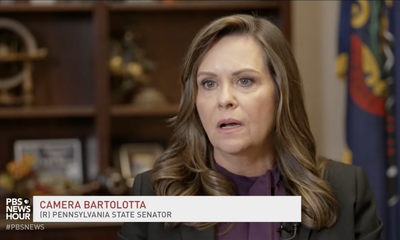
Screenshot of State Senator Camera Bartolotta via PBS NewsHour
Key terms:
- Direct file (noun) – Allowance by the state for prosecutors to file charges against a juvenile directly in adult criminal court
- Superpredator (noun) – a criminology theory, regarded by some scholars as a myth, that holds that a segment of the youth were compelled to commit violent crimes without remorse
- Bipartisan (adjective) – something that involves cooperation among two political parties, i.e. the Democratic and Republican parties
- Charge (verb) – to accuse someone with something, especially under the offense of the law
- Convict (verb) – to declare someone guilty of a criminal offense via the decision of court of law
- Repeat Offender (noun) – an individual who has previously violated the law
- Decertify (verb) – to remove certification of something that fails to comply with institutional standards
- Expunge (verb) – to erase or remove completely, particularly from public record
KEY DISTINCTIONS:
Adult court vs. Juvenile court:
The system in juvenile courts is more focused on rehabilitation, emphasizing treatment and education rather than punishment.
Adult court hearings are open to the public while juvenile court hearings are closed to the public. Especially in Pennsylvania, there is no jury in juvenile court. Conversely, a jury is summoned for adult court. Finally, in adult court, if the defendant is found guilty, they are convicted, whereas in juvenile court the child is legally called an adjudicated delinquent.
Focus Questions
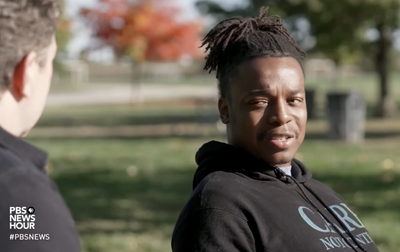
Screenshot of Andre Simms via PBS NewsHour
Why does Andre Simms call the system a “revolving door?” Do you agree with this assessment?
Media literacy :
- What are some legal terms or concepts in this story you think could be more explored, especially in a long-form format?
- Do you think this report was balanced? If not, what other characters or stakeholders would you include?
- How effectively were all relevant perspectives represented? Were the perspectives and situations of those most affected by direct file covered properly?
For More
What students can do : How would you report this story?
- What questions would you ask of Andre Simms, Malik Pickett, State Senator Camera Bartolotta, District Attorney Jack Stollsteimer and David Harrington?
- What resources (academic, anecdotal, public data) would you want to use to tell this story?
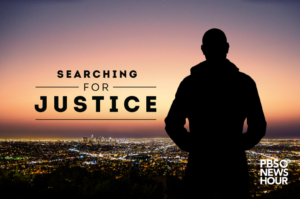
This story is part of NewsHour's Searching for Justice series. Searching for Justice explores criminal justice reforms unfolding across the country, as the leaders from both sides of the political aisle attempt to end mass incarceration by rethinking laws that some say have become barriers to work, housing, and economic stability.
Click here for more stories and the series and watch for more NewsHour Classroom lesson content based on Searching for Justice stories.
Contributed by Cale Holmes, who will be spoke at his alma mater, Randolph College, on Feb. 21, 2023, about his journalism career and what it was like reporting from China.
Fill out this form to share your thoughts on Classroom’s resources. Sign up for NewsHour Classroom’s ready-to-go Daily News Lessons delivered to your inbox each morning.
